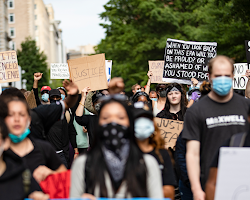
Colonization is the act of settling a new land and establishing control over it. It is often associated with the forced displacement of native peoples and the exploitation of their resources. In the modern day, there are a number of factors that could be considered the equivalent of colonization.
One factor is the rise of global capitalism. Multinational corporations have a significant presence in many developing countries, and they often operate with little regard for local laws or customs. This can lead to the exploitation of workers, the destruction of the environment, and the erosion of traditional cultures.

Another factor is the increasing militarization of the world. The United States and other developed countries have a large military presence in many developing countries. This can lead to the displacement of civilians, the erosion of civil liberties, and the suppression of dissent.
In the United States, there are a number of social divisions that could be considered the equivalent of colonization. One division is the racial divide. African Americans and other minority groups continue to face discrimination in all aspects of life, from housing to employment to education. This discrimination has its roots in the history of slavery and Jim Crow, and it has created a system of racial inequality that persists to this day.

Another division is the economic divide. The gap between the rich and the poor is growing wider, and this gap is disproportionately affecting minority groups. This economic inequality is creating a system of class stratification that is reminiscent of the colonial era.
The modern day version of colonization is a complex and multifaceted issue. It is caused by a number of factors, including global capitalism, militarization, and social divisions. It is a problem that will require a concerted effort to solve.

Here are some additional thoughts on the modern day version of colonization:
* Colonization is not always a physical act. It can also be a process of cultural assimilation, where the dominant culture imposes its values and beliefs on a minority group.
* Colonization can have a lasting impact on a society. It can create a legacy of inequality, poverty, and oppression.
* It is important to remember that colonization is not inevitable. It is a choice that is made by individuals and institutions. We can choose to resist colonization and build a more just and equitable world.
Historical Facts: | “How the United States Congress Wanted to Fund Colonization Back to Africa for Black People”
In the 19th century, there was a growing movement in the United States to colonize Black people back to Africa. This movement was supported by some white abolitionists who believed that it would be the best way to end slavery and racial discrimination.
The American Colonization Society (ACS) was founded in 1816 by a group of white abolitionists, including Benjamin Lundy and Henry Clay. The ACS’s goal was to establish a colony in Africa for free Black people. The ACS raised money to support the colonization effort, and it also lobbied the United States Congress to support its cause.
In 1819, the United States Congress passed the **Missouri Compromise**. This law admitted Missouri as a slave state and Maine as a free state, and it also prohibited slavery in the Louisiana Purchase north of the 36°30′ parallel. The Missouri Compromise was a compromise between pro-slavery and anti-slavery factions in Congress.
The Missouri Compromise also included a provision that the United States would provide financial assistance to the ACS to establish a colony for free Black people in Africa. The ACS used this money to establish the colony of Liberia in 1822.
The colonization movement was controversial. Some Black people opposed the movement, arguing that it was a way to get rid of free Black people from the United States. Others supported the movement, arguing that it would give them a chance to start a new life in Africa.
The colonization movement declined in the late 19th century. This was due to a number of factors, including the end of slavery, the rise of Jim Crow laws, and the growing Pan-African movement.
The United States Congress never fully funded the colonization effort. The ACS raised most of the money to support the colonization effort, and it also received some financial assistance from the Liberian government.
The colonization movement was an egregious act against a people. It was an attempt to solve the problem of racism by getting rid of Black people from the United States. The colonization movement was a failure, and it did not achieve its goal of ending racism.
Here are some additional historical facts about the colonization movement:
* The ACS was founded by a group of white abolitionists, but it was soon taken over by pro-slavery forces.
* The ACS was supported by some Black people, but it was opposed by many others.
* The colonization movement was controversial from the start, and it declined in the late 19th century.
* The United States Congress never fully funded the colonization effort.
* The colonization movement was an egregious act against a people.
No comments:
Post a Comment
Welcome to Leave a Comment